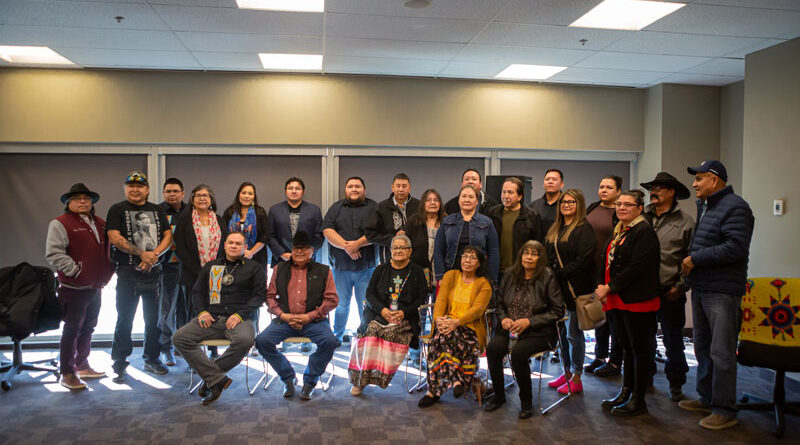Blackfoot Confederacy signatories announce complaint against ISC
By John Watson Local Journalism Initiative Reporter

John Watson Photo
Siksika Nation, in conjunction with the Kainai and Piikani Nations, hosted a press conference on Oct. 12 to discuss a complaint filed against Indigenous Services Canada (ISC).
The complaint, filed with the Canadian Human Rights Tribunal (CHRT), was made to address systemic discrimination against adult members of the Blackfoot Nations living with developmental disabilities through the Persons with Developmental Disabilities Program (PDD).
Carly Fox, speaking on behalf of Fox Fraser LLP, said the firm has spent the past several months working with the Blackfoot Nations making the claim and learning about their situations.
“One thing that we learned is that all of these families have a choice. They can either stay at home and live on the reserve with their culture, with their communities, or they can move off reserve in order to access services that are essential for the health and well being of their loved ones,” said Fox. “Being a First Nations person who lives on reserve should not mean that you don’t have access to health services that other people in Alberta receive.”
The basis of the complaint includes continuous discrimination cased by the ISC based on race, national or ethnic origin, disability, or an intersecting combination of such factors.
The Blackfoot Nations involved in the claim are voicing how the federal government has failed to fund and support services necessary to enable full participation in society for First Nations adults with disabilities.
Siksika Nation’s Chief Ouray Crowfoot said it is the responsibility of chief and council to be the voice for their people.
“We are not seeking anything that every other Albertan doesn’t already receive. The thing that I have said constantly for three years is fair and equitable treatment,” said Crowfoot. “We are Albertans just like everybody else is Albertans. Our members shouldn’t have to leave the reserve to receive the same treatment they would in Calgary or any other municipality.”
The goal of the claim is to help establish stable and equitable funding for the creation of comprehensive and culturally appropriate programs, supports and services to meet the individual needs of the Blackfoot Nations.
Additionally, it aims to see transitional supports created for First Nations individuals with disabilities who are transitioning from childhood to adulthood.
Crowfoot said during the claim announcement, the Blackfoot Confederacy consisting of Siksika, Kainai and Piikani, comprises roughly 25 per cent of First Nations peoples in Alberta, and 80 per cent of First Nations in the Southern Alberta region.
“This is going to have a big impact, but it’s not just going to impact the Blackfoot Nations. There are other Nations suffering from the same (problem),” said Crowfoot. “When you talk about social and cultural isolation, the people who need support the most shouldn’t be asked to leave their communities in order to receive those supports.”
